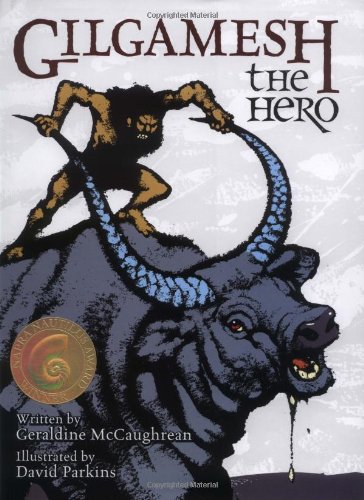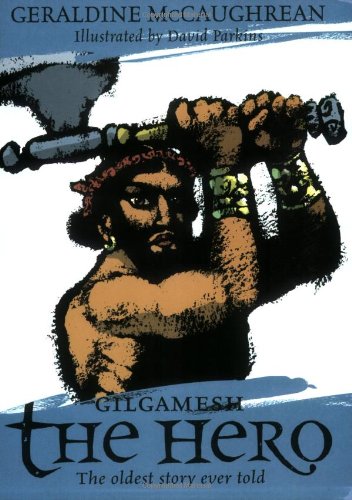-
Gilgamesh the King
Ludmila Zeman
Paperback (Tundra Books, April 25, 1998)Gilgamesh, half-god and half-man, in his loneliness and isolation becomes a cruel tyrant over the citizens of Uruk. To impress them forever he orders a great wall to be built, driving his people to exhaustion and despair so that they cry to the Sun God for help. In answer, another kind of man, Enkidu, is sent to earth to live among the animals and learn kindness from them. He falls in love with Shamhat, a singer from the temple, and he follows her back to Uruk. There, Enkidu, the “uncivilized” beast from the forest, shows the evil Gilgamesh through friendship what it means to be human. N
N
-
Gilgamesh the Hero
Geraldine McCaughrean, David Parkins
Hardcover (Eerdmans Books for Young Readers, June 20, 2003)This is one of the oldest stories in the world, and it's about things that still matter to us today: friendship, fame, courage, happiness.Gilgamesh and Enkidu are friends -- best friends. Together they can work wonders, fight monsters, brave earthquakes, travel the world! But waiting in the dark is the one enemy they can never overcome.Retold by award-winning author Geraldine McCaughrean, and illustrated with great power by David Parkins, Gilgamesh the Hero is a story that will linger in the imagination long after the book has been put down. T
T
-
Gilgamesh the King
Ludmila Zeman
Hardcover (Tundra Books, July 1, 1999)Gilgamesh, half-god and half-man, in his loneliness and isolation becomes a cruel tyrant over the citizens of Uruk. To impress them forever he orders a great wall to be built, driving his people to exhaustion and despair so that they cry to the Sun God for help. In answer, another kind of man, Enkidu, is sent to earth to live among the animals and learn kindness from them. He falls in love with Shamhat, a singer from the temple, and he follows her back to Uruk. There, Enkidu, the “uncivilized” beast from the forest, shows the evil Gilgamesh through friendship what it means to be human. N
N
-
Gilgamesh the King
Ludmila Zeman
Hardcover (Tundra Books, Sept. 16, 1992)None
-
The Hero King Gilgamesh
Irving Finkel
Hardcover (British Museum Press, Aug. 16, 1998)None
-
Gilgamesh the King
Ludmila Zeman
Library Binding (Perfection Learning, April 25, 1998)Gilgamesh, half-god and half-man, in his loneliness and isolation becomes a cruel tyrant over the citizens of Uruk. To impress them forever he orders a great wall to be built, driving his people to exhaustion and despair so that they cry to the Sun God for help. In answer, another kind of man, Enkidu, is sent to earth to live among the animals and learn kindness from them. He falls in love with Shamhat, a singer from the temple, and he follows her back to Uruk. There, Enkidu, the "uncivilized" beast from the forest, shows the evil Gilgamesh through friendship what it means to be human. "From the Hardcover edition." Q
Q
-
Gilgamesh The King
Ludmila Zeman
School & Library Binding (Turtleback Books, April 25, 1998)FOR USE IN SCHOOLS AND LIBRARIES ONLY. Lonely and cruel, King Gilgamesh reigns terror over the people of Uruk. Crying out to the Sun God for help, the people are sent Enkidu, an ""uncivilized"" man who becomes friends to the king and teaches him how to be human. M
M
-
Gilgamesh the Hero
Geraldine McCaughrean, David Parkins
Paperback (Oxford Univ Pr, Aug. 31, 2002)A major publishing event - two of the UK's outstanding prize-winning artists working together for the first timeThe legend of Gilgamesh is the oldest written story, pre-dating both The Bible and The Iliad. An epic story about a quest for immortality, it also includes a legend of the Flood that is remarkably similar to the story of Noah.* Geraldine McCaughrean has won every major prize for children's literature in this country, including the Carnegie Medal, the Whitbread Award, the Guardian Children's Fiction Award, and, most recently, The Blue Peter Best Book to Keep Forever Award.* David Parkins is a highly acclaimed artist, and has been shortlisted for the Kurt Maschler and Smarties awards. He received many critical accolades for God's Story with Jan Mark T
T
-
The Gilgamesh Epic
Anonymous
eBook (Sheba Blake Publishing, Sept. 1, 2018)The Gilgamesh Epic is an epic poem from ancient Mesopotamia that is often regarded as the earliest surviving great work of literature. The literary history of Gilgamesh begins with five Sumerian poems about 'Bilgamesh' (Sumerian for 'Gilgamesh'), king of Uruk, dating from the Third Dynasty of Ur (circa 2100 BC).These independent stories were later used as source material for a combined epic. The first surviving version of this combined epic, known as the "Old Babylonian" version, dates to the 18th century BC and is titled after its incipit, Shūtur eli sharrī ("Surpassing All Other Kings"). Only a few tablets of it have survived. The later "Standard" version dates from the 13th to the 10th centuries BC and bears the incipit Sha naqba īmuru ("He who Saw the Deep", in modern terms: "He who Sees the Unknown"). Approximately two thirds of this longer, twelve-tablet version have been recovered.Some of the best copies were discovered in the library ruins of the 7th-century BC Assyrian king Ashurbanipal. The first half of the story discusses Gilgamesh, king of Uruk, and Enkidu, a wild man created by the gods to stop Gilgamesh from oppressing the people of Uruk. After an initial fight, Gilgamesh and Enkidu become close friends. Together, they journey to the Cedar Mountain and defeat Humbaba, its monstrous guardian. Later they kill the Bull of Heaven, which the goddess Ishtar sends to punish Gilgamesh for spurning her advances. As a punishment for these actions, the gods sentence Enkidu to death.In the second half of the epic, distress about Enkidu's death causes Gilgamesh to undertake a long and perilous journey to discover the secret of eternal life. He eventually learns that "Life, which you look for, you will never find. For when the gods created man, they let death be his share, and life withheld in their own hands".
-
The Gilgamesh Epic
Anonymous
eBook (Sheba Blake Publishing, April 14, 2017)The Gilgamesh Epic is an epic poem from ancient Mesopotamia that is often regarded as the earliest surviving great work of literature. The literary history of Gilgamesh begins with five Sumerian poems about 'Bilgamesh' (Sumerian for 'Gilgamesh'), king of Uruk, dating from the Third Dynasty of Ur (circa 2100 BC). These independent stories were later used as source material for a combined epic. The first surviving version of this combined epic, known as the "Old Babylonian" version, dates to the 18th century BC and is titled after its incipit, Shūtur eli sharrī ("Surpassing All Other Kings"). Only a few tablets of it have survived. The later "Standard" version dates from the 13th to the 10th centuries BC and bears the incipit Sha naqba īmuru ("He who Saw the Deep", in modern terms: "He who Sees the Unknown"). Approximately two thirds of this longer, twelve-tablet version have been recovered. Some of the best copies were discovered in the library ruins of the 7th-century BC Assyrian king Ashurbanipal. The first half of the story discusses Gilgamesh, king of Uruk, and Enkidu, a wild man created by the gods to stop Gilgamesh from oppressing the people of Uruk. After an initial fight, Gilgamesh and Enkidu become close friends. Together, they journey to the Cedar Mountain and defeat Humbaba, its monstrous guardian. Later they kill the Bull of Heaven, which the goddess Ishtar sends to punish Gilgamesh for spurning her advances. As a punishment for these actions, the gods sentence Enkidu to death. In the second half of the epic, distress about Enkidu's death causes Gilgamesh to undertake a long and perilous journey to discover the secret of eternal life. He eventually learns that "Life, which you look for, you will never find. For when the gods created man, they let death be his share, and life withheld in their own hands".
-
Gilgamesh The Hero
Geraldine McCaughrean, David Parkins
Hardcover (Oxford University Press, Sept. 30, 2002)A major publishing event - two of the UK's outstanding prize-winning artists working together for the first timeThe legend of Gilgamesh is the oldest known story, pre-dating both The Bible and The Iliad. An epic story about a quest for immortality, it also includes a legend of the Flood that is remarkably similar to the story of Noah.* Geraldine McCaughrean has won every major prize for children's literature in this country, including the Carnegie Medal, the Whitbread Award, the Guardian Children's Fiction Award, and, most recently, The Blue Peter Best Book to Keep Forever Award* David Parkins is a highly acclaimed artist, and has been shortlisted for the Kurt Maschler and Smarties awards. He received many critical accolades for God's Story with Jan Mark T
T
-
Gilgamesh the King
Ludmila Zeman
Paperback (Tundra Books, Aug. 27, 1998)None